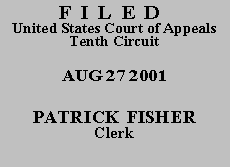

| LELAND MATTS,
Plaintiff-Appellant, v. LARRY G. MASSANARI, Acting Commissioner of Social Security Administration, Defendant-Appellee. |
|
Claimant Leland Matts appeals from the district court's orders(1) affirming the Social Security Administration's denial of disability benefits. We have jurisdiction over this appeal by virtue of 28 U.S.C. § 1291. Our review is limited to determining whether the record as a whole contains substantial evidence to support the agency's decision and whether it applied the correct legal standards. See Hamilton v. Sec'y of Health & Human Servs., 961 F.2d 1495, 1497-98 (10th Cir. 1992).
After administrative denial of claimant's application for disability benefits, a hearing was held before an administrative law judge (ALJ). The ALJ acknowledged that claimant had a severe impairment, chronic lymphocytic leukemia (CLL), but determined that claimant retained the residual functional capacity to perform light and sedentary work with certain restrictions, including "minimal contact with the general public." Aplt. App., Vol. II, at 13-14. The ALJ found that claimant could return to his past relevant work and concluded that he was not disabled.
On appeal, claimant contends that the restriction against more than minimal contact with the general public is inconsistent because it does not limit his contact with co-workers. He argues that his risk of infection from them is as great or greater than that from the general public. He also contends that the ALJ ignored his fear of infection as a potential mental impairment.
Because the ALJ determined that claimant could return to his past relevant work, claimant's application was determined at step four of the applicable analysis. See Williams v. Bowen, 844 F.2d 748, 50-52 (10th Cir. 1988) (describing five steps in detail). At step four, claimant retains the burden of proof to show that he is disabled. See Nielson v. Sullivan, 992 F.2d 1118, 1120 (10th Cir. 1993). In light of this burden, we conclude, as did the district court, that claimant's arguments here fail to demonstrate either legal error or lack of record support regarding the ALJ's determination of claimant's residual functional capacity. For substantially the same reasons contained in the magistrate judge's orders, the judgment of the United States District Court for the Northern District of Oklahoma is AFFIRMED.
Entered for the Court
Circuit Judge
*. This order and judgment is not binding precedent, except under the doctrines of law of the case, res judicata, and collateral estoppel. The court generally disfavors the citation of orders and judgments; nevertheless, an order and judgment may be cited under the terms and conditions of 10th Cir. R. 36.3.
1. The parties consented in the district court to proceed before a magistrate judge pursuant to 28 U.S.C. § 636(c). The magistrate judge entered an order on October 5, 2000, affirming the agency's denial of benefits, and a second order on November 13, 2000, denying claimant's motion for reconsideration.